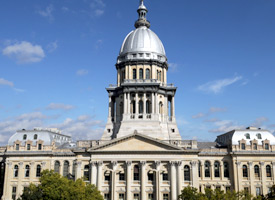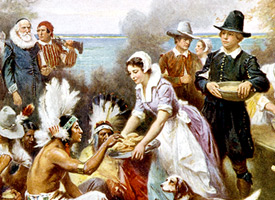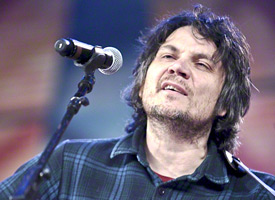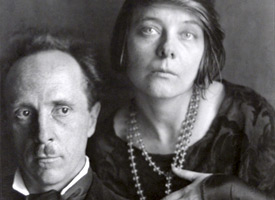- Details
 On this day in 1818, Illinois achieved full statehood, becoming the 21st state in the Union. At the time, Illinois was full of vast prairies and contained only around 35,000 people, most of whom lived in Southern Illinois.
On this day in 1818, Illinois achieved full statehood, becoming the 21st state in the Union. At the time, Illinois was full of vast prairies and contained only around 35,000 people, most of whom lived in Southern Illinois.
Many of the first settlers to Illinois came from Kentucky and Tennessee. Familiar with forested areas, the new settlers did not believe Illinois’ prairies were good for cultivation. The advent of new farming tools encouraged growth to the north, and within just ten years, Illinois’ population would reach more than 150,000.
Illinois would continue attracting settlers for decades to come. As the state’s economy shifted from agrarian to manufacturing in the early 20th century, immigrants from all over the world came to Illinois to work in the ever-expanding manufacturing facilities across the state.
Today, Illinois’ economy continues its transition from traditional manufacturing-based to service-oriented industries. Boasting a population of nearly 13 million residents, Illinois continues to grow and be a worldwide destination for international immigrants and investment.
Learn more:
Illinois becomes the 21st state (The History Channel)
- Details
 Miami Heat superstar Dwyane Wade grew up in Illinois. Before winning two National Basketball Association Championships, Wade played basketball at Harold L. Richards High School in Oak Lawn, a suburb of Chicago.
Miami Heat superstar Dwyane Wade grew up in Illinois. Before winning two National Basketball Association Championships, Wade played basketball at Harold L. Richards High School in Oak Lawn, a suburb of Chicago.
Wade played for the University of Marquette for two seasons before being drafted fifth by the Miami Heat in the 2003 NBA Draft. In 2006, he was named NBA Finals MVP after securing his first NBA Championship. Six years later, Wade obtained his second NBA Championship after teaming up with Lebron James and Chris Bosh in 2010.
Although Wade is prominently known for his success on the court, he has also become involved in the community through the Wade’s World Foundation which he established in 2004. Through his foundation, Wade helps out a number of communities throughout the country.
Learn more:
The official Dwyane Wade website
- Details
 The idea of creating a formal national Thanksgiving Day holiday originated with Illinois born President Abraham Lincoln?
The idea of creating a formal national Thanksgiving Day holiday originated with Illinois born President Abraham Lincoln?
In an 1863 proclamation – amid the still-raging Civil War – Lincoln designated Thanksgiving to be celebrated on the fourth Thursday of November.
"He was always looking for ways to unify the nation in a terrible time of war," said Lincoln biographer Ronald C. White Jr.
Learn more:
Official Thanksgiving Holiday - USA Today
Thanksgiving in the United States
- Details
 Born in Belleville in 1967, while in high school, Mr. Tweedy formed a close bond with classmate Jay Farrar. The two eventually formed a band called The Primatives. That band would go on to become Uncle Tupelo and according to music critics almost single-handedly created the “alt-country” genre, which combines the plaintive sounds of early country music with the raucous electric guitar and drum sounds of punk. Mr. Tweedy briefly attended Southern Illinois University – Edwardsville before dropping out to focus on music full-time.
Born in Belleville in 1967, while in high school, Mr. Tweedy formed a close bond with classmate Jay Farrar. The two eventually formed a band called The Primatives. That band would go on to become Uncle Tupelo and according to music critics almost single-handedly created the “alt-country” genre, which combines the plaintive sounds of early country music with the raucous electric guitar and drum sounds of punk. Mr. Tweedy briefly attended Southern Illinois University – Edwardsville before dropping out to focus on music full-time.
After Uncle Tupelo’s acrimonious disbanding, Mr. Tweedy founded Wilco and in the process, moved back to Illinois from St. Louis. Settling in Chicago, Wilco became one of the torchbearers for alternative rock music in the late 20th and early 21st centuries. Dropped from their label Reprise for delivering what the label deemed to be “uncommercial” music, the band bought the master tapes and was signed by another label releasing 2001’s “Yankee Hotel Foxtrot” to massive critical and commercial success. 2005’s follow-up “A Ghost is Born” earned the band two Grammy awards.
Most recently, Mr. Tweedy has begun playing shows with his son Spencer under the band name Tweedy.
Learn more:
Jeff Tweedy biography
Wilco homepage
Tweedy - NPR Tiny Desk Concert
- Details
 Born in Highland Park, Illinois, Edward Weston is celebrated as one of the most groundbreaking and influential American photographers, having photographed a vast array of subjects, from landscape to narrative, and everything in between.
Born in Highland Park, Illinois, Edward Weston is celebrated as one of the most groundbreaking and influential American photographers, having photographed a vast array of subjects, from landscape to narrative, and everything in between.
Weston’s passion for photography bloomed at an early age after receiving a Kodak Bullseye camera for his 16th birthday. He spent his time photographing Chicago parks and soon purchased a used 5x7 camera, as he began to develop his own film and prints. From this humble start flowered a 40 year career in the arts.
In 1906, Weston moved to Tropico, California to pursue a career in photography. Weston remained in California for the remainder of his life, photographing in and around Big Sur. In 1937, Weston became the first photographer ever to be awarded a Guggenheim Fellowship.
Edward Weston passed away at his home on Wildcat Hill in 1958. His sons scattered his ashes at Point Lobos, later named Weston Beach.
Learn more:
The Edward Weston / Cole Westong family website
Edward Weston at Encyclopædia Britannica
Edward Weston biography at Encyclopedia.com
More Articles …
- Did You Know? “Wild Bill" Hickok was an Illinois native
- Did You Know? Illinois has the second highest composite ACT scores in the nation
- Did You Know? Actor Terrence Howard was born in Chicago
- Did You Know? Melissa McCarthy was born in Plainfield
- Did You Know? Boxing champ Ken Norton was from Illinois





